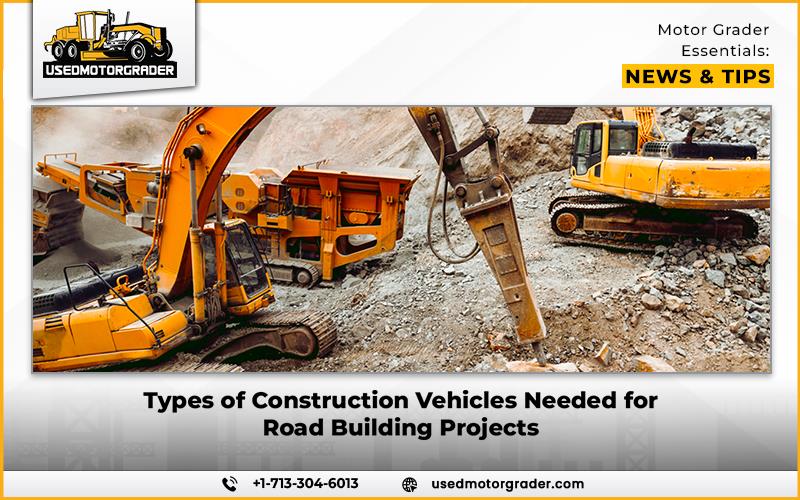Developing road infrastructure remains essential because it lets people connect cities across the nation and makes moving goods and services happen for national prosperity. Construction of road networks requires specific equipment for each task because of the complexity of road construction operations. This heavy equipment machinery enables quality work by performing all necessary tasks, including preparing the ground and creating foundations. The proper machines help projects run faster while saving time and keep road surfaces strong for many years against traffic and natural forces.
Site Preparation Vehicles
Road construction starts only after preparing the land by removing trees and rocks to create a flat surface for foundation work. Bulldozers are used at the construction site first to push aside natural obstacles and make a workable area for the team. After excavators clear the land, they create drainage ditches and move major barriers out of the way. Motor graders improve the road surface preparation by making it level and smooth for foundation work. The road construction project demands dump trucks to carry soil, gravel, and waste materials between the site whenever necessary. Site preparation machines affect road quality and protect it from water damage and surface problems.
Foundation and Earthwork Vehicles
To handle vehicle load and protect against early damage, a strong road base is necessary. Compact construction vehicles like rollers reduce material space by pressing down on soil, gravel, and asphalt until they create a stable surface that prevents subsidence. Scrapers help move and flatten large volumes of earth before making the soil dense through compaction. Wheel loaders move gravel, sand, and asphalt to support construction work moving forward. Roads undergo fast deterioration when earthwork and foundation compaction do not happen correctly, which makes repair costs go up.
Paving and Surfacing Vehicles
After building the foundation, specialized machinery is used to place asphalt or concrete efficiently for paving. Road construction requires asphalt pavers to spread hot asphalt evenly and level it before the compaction process. When building concrete roads and bridge decks, concrete pavers work perfectly to place and smooth out the material. Bitumen distributors apply a bonding material before asphalt paving to make sure the surface stays strong and resistant to damage. A tandem roller follows paving work to pack the surface flat and create an even surface. These paving vehicles need to work perfectly to make roads last longer and perform better under all weather and traffic conditions.
Bridge and Highway Construction Vehicles
Additional heavy equipment operations are necessary to build highways and bridges because these projects need specialized machinery that supports large-scale construction works. To build a stable foundation, Pile drivers drive piles deep into the ground at sites where bridges need to span over water, valleys, or weak earth surfaces. Construction companies use tower cranes to place heavy concrete beams, steel girders, and construction materials at elevated heights. The concrete mixers work nonstop to supply new concrete throughout the project site so every section maintains equal strength. This equipment builds strong roads and bridges that handle heavy daily traffic without breaking down.
Road Marking and Finishing Vehicles
After building the road surface, additional elements need to be added to make driving safer and easier. Line striping machines use paint to mark traffic routes and road safety elements to help drivers navigate safely. Sweeper trucks clean fresh pavements to take away dust and leftover materials before allowing drivers on the road. Guardrail installation trucks work to put safety barriers on highways to keep drivers safe from accidents. When completing roads, the finishing work matters as much as construction because it makes the road able to use safely and easy to use.
Technological Advances in Road Construction Vehicles
New road-building equipment technology improves both building performance and environmental protection. New machine systems are now available that use self-driving and artificial intelligence technology to perform work better and protect workers from risks. GPS-control systems help graders and pavers perform accurate measurements while consuming fewer materials and reducing mistakes.
Construction vehicles that use electricity or fuel mixtures help builders produce roads more environmentally friendly by using less fuel and producing fewer emissions. With telematics systems, businesses can view their equipment performance data as it happens, so they can fix problems early to avoid breakdowns. Road construction technology advances will make projects more productive and less expensive, with an added benefit of helping the environment.
In Summary
Every road construction project uses numerous unique vehicles that help build different parts of the project. Construction equipment performs every part of road building, including groundwork to paving work, with bridge construction and surface preparation. The selection of appropriate equipment makes operations faster and less expensive while producing better road quality. The sector will see better and greener equipment become standard in creating structures that last and operate more safely into the future. Highway and road construction will follow new paths as the engineers use advanced machines and their skills together.


